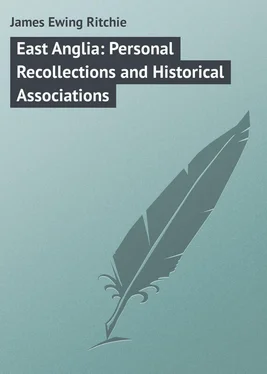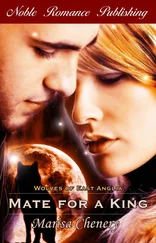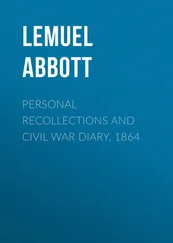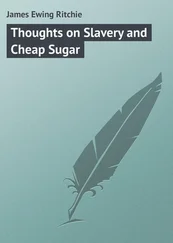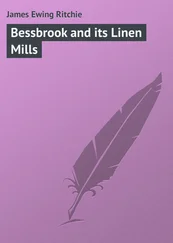James Ritchie - East Anglia - Personal Recollections and Historical Associations
Здесь есть возможность читать онлайн «James Ritchie - East Anglia - Personal Recollections and Historical Associations» — ознакомительный отрывок электронной книги совершенно бесплатно, а после прочтения отрывка купить полную версию. В некоторых случаях можно слушать аудио, скачать через торрент в формате fb2 и присутствует краткое содержание. Жанр: foreign_prose, на английском языке. Описание произведения, (предисловие) а так же отзывы посетителей доступны на портале библиотеки ЛибКат.
- Название:East Anglia: Personal Recollections and Historical Associations
- Автор:
- Жанр:
- Год:неизвестен
- ISBN:нет данных
- Рейтинг книги:5 / 5. Голосов: 1
-
Избранное:Добавить в избранное
- Отзывы:
-
Ваша оценка:
- 100
- 1
- 2
- 3
- 4
- 5
East Anglia: Personal Recollections and Historical Associations: краткое содержание, описание и аннотация
Предлагаем к чтению аннотацию, описание, краткое содержание или предисловие (зависит от того, что написал сам автор книги «East Anglia: Personal Recollections and Historical Associations»). Если вы не нашли необходимую информацию о книге — напишите в комментариях, мы постараемся отыскать её.
East Anglia: Personal Recollections and Historical Associations — читать онлайн ознакомительный отрывок
Ниже представлен текст книги, разбитый по страницам. Система сохранения места последней прочитанной страницы, позволяет с удобством читать онлайн бесплатно книгу «East Anglia: Personal Recollections and Historical Associations», без необходимости каждый раз заново искать на чём Вы остановились. Поставьте закладку, и сможете в любой момент перейти на страницу, на которой закончили чтение.
Интервал:
Закладка:
It was to the Brewsters that the village was indebted for the ministry of the Rev. John Phillip, who married the sister of the pious and learned Dr. Ames, Professor of the University of Franeker. Calamy tells us that by means of Dr. Ames, Mr. Phillip had no small furtherance in his studies, and intimate acquaintance with him increased his inclination to the Congregational way. Archbishop Abbot, writing to Winwood, 1611, says: ‘I have written to Sir Horace Vere touching the English preacher at the Hague. We heard what he was that preceded, and we cannot be less cognisant what Mr. Ames is, for by a Latin printed book he hath laden the Church and State of England with a great deal of infamous contumely, so that if he were amongst us he would be so far from receiving preferment, that some exemplary punishment would be his reward. His Majesty had been advertised how this man is entertained and embraced at the Hague, and how he is a fit person to breed up captains and soldiers there in mutiny and faction.’ One of Dr. Ames’s works, which got him into trouble, was entitled ‘A Fresh Suit against Ceremonies,’ a work which we may be sure would be as distasteful to the Ritualists of our day as it was to the Ritualists of his own. One of his works, his ‘Medulla Theologiæ,’ I believe, adorned the walls of the paternal study. There is, belonging to the Wrentham Congregational Church Library, a volume of tracts, sixty-seven in number, of six or eight pages each, printed in 1622, forming a series of theses on theological topics, maintained by different persons, under the presidency of Dr. Ames; and I believe a son of the Doctor is buried in Wrentham Churchyard, as I recollect my father, on one occasion, had an old gravestone done up and relettered, which bore testimony to the virtues and piety and learning of an Ames. Thus if Mr. Phillip was chased out of Old England into New England for his Nonconformity, some of the good old Noncons remained to uphold the lamp which was one day to cast a sacred light on all quarters of the land. That some did emigrate with their pastor is probable, since we learn that there is a town called Wrentham across the Atlantic, said to have received that name because some of the first settlers came from Wrentham in England.
Touching Mr. Phillip, a good deal has been written by the Rev. John Browne, the painstaking author of ‘The History of Congregationalism in Suffolk and Norfolk.’ It appears that his arrival in America was not unexpected, as the Christian people of Dedham had invited him to that plantation beforehand. He did not, however, accept their invitation, but being much in request, ‘and called divers ways, could not resolve; but, at length, upon weighty reasons concerning the public service and foundations of the college, he was persuaded to attend to the call of Cambridge;’ and, adds an American writer, ‘he might have been the first head of that blessed institution.’ On the calling of the Long Parliament, he and his wife returned to England, and in 1642 we find him ministering to his old flock. So satisfied were the neighbouring Independents of his Congregationalism, that when, in 1644, members of Mr. Bridge’s church residing in Norwich desired to form themselves into a separate community, they not only consulted with their brethren in Yarmouth, but with Mr. Phillip also, as the only man then in their neighbourhood on whose judgment and experience they could rely. In 1643 Mr. Phillip was appointed one of the members of the Assembly of Divines, and was recognised by Baillie in his Letters as one of the Independent men there. The Independents, as we know, sat apart, and were a sad thorn in the Presbyterians’ side. Five of them, more zealous than the rest, formally dissented from the decisions of the Assembly, and afraid that toleration would not be extended to them, appealed to Parliament, ‘as the most sacred refuge and asylum for mistaken and misjudged innocence.’ Mr. Phillip’s name, however, I do not find in that list; and possibly he was too old to be very active in the matter. He lived on till 1660, when he died at the good old age of seventy-eight. In the later years of his ministry he was assisted by his nephew, W. Ames, who in 1651 preached a sermon at St. Paul’s, before the Lord Mayor and Aldermen, ‘On the Saint’s Security against Seducing Sports, or the Anointing from the Holy One.’ It is to be feared, in our more enlightened age, a good Wrentham Congregational minister would have little chance of preaching before a London Lord Mayor. Talent is supposed to exist only in the crowded town, where men have no time to think of anything but of the art of getting on.
Other heroic associations – of men who had suffered for the faith, who feared God rather than man, who preferred the peace of an approving conscience to the vain honours of the world – also were connected with the place. I remember being shown a bush in which the conventicle preacher used to hide himself when the enemy, in the shape of the myrmidons of Bishop Wren, of Norwich, were at his heels. That furious prelate, as many of us know, drove upwards of three thousand persons to seek their bread in a foreign land. Indeed, to such an extent did he carry out his persecuting system, that the trade and manufactures of the country materially suffered in consequence. However, in my boyish days I was not troubled much about such things. Dissent in Wrentham was quite respectable. If we had lost the Brewster family, whose arms were still to be seen on the Communion plate, a neighbouring squire attended at the meeting-house, as it was then the fashion to call our chapel, and so did the leading grocer and draper of the place, and the village doctor, the father of six comely daughters; and the display of gigs on a Sunday was really imposing. Alas! as I grew older I saw that imposing array not a little shorn of its splendour. The neighbouring baronet, Sir Thomas Gooch, M.P., added as he could farm to farm, and that a Dissenter was on no account to have one of his farms was pretty well understood. I fancy our great landlords have, in many parts of East Anglia, pretty well exterminated Dissent, to the real injury of the people all around. I write this advisedly. I dare say the preaching in the meeting-house was often very miserably poor. The service, I must own, seemed to me often peculiarly long and unattractive. There was always that long prayer which was, I fear, to all boys a time of utter weariness; but, nevertheless, there was a moral and intellectual life in our Dissenting circle that did not exist elsewhere. It was true we never attended dinners at the village public-house, nor indulged in card-parties, and regarded with a horror, which I have come to think unwholesome, the frivolity of balls or the attractions of a theatre; but we had all the new books voted into our bookclub, and, as a lad, I can well remember how I revelled in the back numbers of the Edinburgh Review , though even then I could not but feel the injustice which it did to what it called the Lake school of poets, and more especially to Coleridge and Wordsworth. Shakespeare also was almost a sealed book, and perhaps we had a little too much of religious reading, such as Doddridge’s ‘Rise and Progress,’ or Baxter’s ‘Saint’s Rest,’ or Alleine’s ‘Call to the Unconverted,’ or Fleetwood’s ‘Life of Christ’ – excellent books in their way, undoubtedly, but not remarkably attractive to boys redolent of animal life, who had thriven and grown fat in that rustic village, on whose vivid senses the world that now is produced far more effect than the terrors or splendours of the world to come.
The country round, if flat, was full of interesting associations. At the back of us – that is, on the sea – was the village of Covehithe, and when a visitor found his way into the place – an event which happened now and then – our first excursion with him or her – for plenty of donkeys were to be had which ladies could ride – was to Covehithe, known to literary men as the birthplace of John Bale, Bishop of Ossory, in Ireland. In connection with donkeys, I have this interesting recollection, that one of the old men of the village told me. At the time of the Bristol riots, he remembered Sir Charles Wetherall, the occasion of them, as a boy at Wrentham much given to donkey-riding. In the history of the drama John Bale takes distinguished rank. He was one of those by whom the drama was gradually evolved, and all to whom it is a study and delight must remember him with regard. His play of ‘Kynge John’ is described by Mr. Collier as occupying an intermediate place between moralities and historical plays – and it is the only known existing specimen of that species of composition of so early a date. Bale, who was trained at the monastery of White Friars, in Norwich, thence went to Jesus College, Cambridge, and was expelled in consequence of the zeal with which he exposed the errors of Popery. However, Bale had a friend and protector in Cromwell, Henry VIII.’s faithful servant. On the death of that nobleman Bale proceeded to Germany, where he appears to have been well received and hospitably entertained by Luther and Melancthon, and on the accession of Edward VI. he returned to England. In Mary’s reign persecution recommenced, and Bale fled to Frankfort. He again returned at the commencement of Elizabeth’s reign, and was made prebend of Canterbury, at which place he died at the age of sixty-three. Covehithe nowadays is not interesting so much as the birthplace of Bale, as on account of its ecclesiastical ruins, which are covered with ivy and venerable in their decay. The church was evidently almost a cathedral, and surely at one time or other there must have been an enormous population to worship in such a sanctuary; and yet all you see now is a public-house just opposite the church, a few cottages, and a farmhouse. A few steps farther bring you to the low cliff, and there is the sea ever encroaching on the land in that quarter and swallowing up farmhouse and farm. Miss Agnes Strickland, who lived at Reydon Hall – a few miles inland – has thus sung the melancholy fate of Covehithe:
Читать дальшеИнтервал:
Закладка:
Похожие книги на «East Anglia: Personal Recollections and Historical Associations»
Представляем Вашему вниманию похожие книги на «East Anglia: Personal Recollections and Historical Associations» списком для выбора. Мы отобрали схожую по названию и смыслу литературу в надежде предоставить читателям больше вариантов отыскать новые, интересные, ещё непрочитанные произведения.
Обсуждение, отзывы о книге «East Anglia: Personal Recollections and Historical Associations» и просто собственные мнения читателей. Оставьте ваши комментарии, напишите, что Вы думаете о произведении, его смысле или главных героях. Укажите что конкретно понравилось, а что нет, и почему Вы так считаете.
